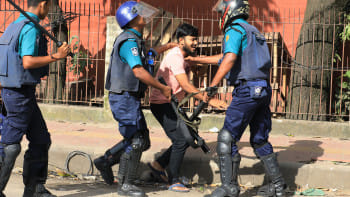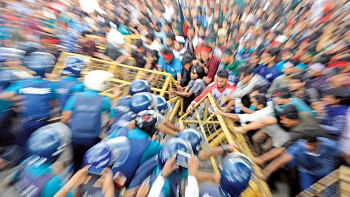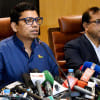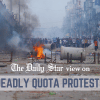Whom do information blackouts during protests ultimately benefit?

When the internet was initially made accessible to the public in the late 1980s, the once-secret communication tool developed by the US military was regarded as a passing fad, reserved for the technically competent and the computer savvy, and not something that would significantly alter daily life. Now, as I write this in the relative information darkness of a country-wide internet shutdown, on a text editor in lieu of Google Docs, with only yesterday's newspapers for fact-checking purposes, it is a sobering reality that we are crippled without access to the internet.
As Bangladesh struggles to contain the outpouring of frustrations of quota reformists, general students and dormant anti-government political opponents who would take advantage of the quota reform movement, internet shutdown is one of the major aspects of control that the Awami League government has exercised to curb the protests.
On July 19, news reports on TV channels communicated the government's official line that nationwide internet outage is due to a fire at a supposedly critical building in Dhaka, contradicting statements made by State Minister of Telecommunications and ICT Zunaid Ahmed Palak that specifically mention enforced shutdown of internet access. Since the night of July 18, internet access has been intentionally withdrawn from the capital, as well as large swaths of the country. Previously, since early July 18, mobile data was completely inoperable across the whole city. This is nothing new, and it was an expected measure from a government that has repeatedly put down mass uprisings by controlling the flow of information.
During past elections and mass mobilisations, the effect of choking the free flow of information has clearly backfired. For example, during the previous quota reform movement and road safety movement in 2018, the nationwide shutdown of Facebook, Messenger, YouTube and mobile data led to a wildfire of rumours and speculations. Whether true or not, such rumours do not do the party any favours.
It is in stark contrast to the general attitude of the Awami League-led government when things are going well. "Smart Bangladesh," "Digital Bangladesh," and the general promise of growth through neoliberal application of technology has long been an election mandate of the party, and to be absolutely fair, the government has largely followed through by steadily increasing the bandwidth of internet connectivity, state-led funding and nurturing of tech parks, startup accelerators, recognition of innovators in the tech industry, and more. However, the price of unmasking a forward-thinking, technology-enabling government is apparently student deaths at the hands of police and Bangladesh Chhatra League during mass uprisings.
When it comes to accepting the blame or taking accountability of state-sponsored violence against students, the proponents of internet and technology-led innovation are equally fickle. The star and darling of startup founders and accelerators, Zunaid Ahmed Palak, has made comments that directly blame Facebook and social media platforms for the deaths of students. Facebook/Meta's complicity in political violence and genocide on a global scale is well-documented, but for Facebook to intentionally target a fourth-year student of English in Rangpur for summary execution—or at least 39 others confirmed killed in the protests as of this writing—is a bit of a stretch. Perhaps the state minister meant it less literally; perhaps he meant the "idea" of Facebook: unfiltered, uncontrolled stating of opinions, political organising, video documentation of police and BCL brutality, requests for help from general people so that high school and university students don't have to face the horrors of it all alone.
The alleged cancellation of 10 Minute School's next round of funding from the state-run Startup Bangladesh, of which Palak is a prominent figurehead, can be interpretated as a vengeful retaliation against 10MS founder Ayman Sadiq's public proclamation of support for the quota reformists. The message is clear: stick to the party line or be prepared to pay for it.
Forcing telecommunication operators to shut down mobile data access or reduce network bandwidth is also a common tactic, and we have seen it employed quite effectively to cut communications between protesting groups across the country. The neoliberal machine of the AL government has ensured, through bullying of tax collectors and regulatory bodies, that every private provider of information technology infrastructure is beholden to the government's requests for access or control.
This is a fact that we have also seen applied to foreign entities. Fearing the loss of access to vast user bases, companies like Meta and Google are commonly seen answering requests by the Bangladesh government for data on specific groups or individuals, and monitoring of supposedly encrypted network traffic on these platforms revealing more about users than they are aware of. While other parts of the world are fighting tooth and nail through enforcement of policies like the EU's General Data Protection Regulations (GDPR) and via anti-trust commissions to protect user data, it is exactly here that we see our own government not only taking steps in the opposite direction, but actively utilising predatory data privacy policies of internet and social media platforms to surveil users in Bangladesh.
It is irony of the highest order that the interconnected nature of everyone's lives through the internet and social media—as promoted and established in part by the Awami League's electoral pledges—is also the bane of the party's existence, and one that requires a variety of measures to control. Whether it's the draconian Digital Security Act (now the Cyber Security Act), ICT Act, or more literal tools like BTRC's network jammer vans, threats against internet service providers and telcos or surveillance tools that monitor and track "persons of interest," the government has shown time and again that they have no qualms using information blackouts during elections and protests to establish their agendas.
Then why promote digital innovation and technology adoption in the first place, if your first order of business during a political crisis is to plunge the country into a medieval-era information blackout?
The answer is simple, and it is a sobering reality for tech innovators and proponents of technology to contend with. The more technology adoption there is, the more dependency there is on mediums of communication that ultimately end up in government control and regulations, the wider the blackout. We have seen how protesters use platforms like Facebook and Messenger to organise and coordinate their movements; by first funnelling them into positions where they depend on platforms like these and then creating a blanket enforced outage when the proverbial excrement hits the fan, the information blackout is double effective and actually crippling.
In a country where political representation, freedom of expression and mass mobilisation around common political issues is severely repressed, it is vital that information blackouts are resisted at the root level. Understanding how information flows are surveilled and where access to information can be severed is a critical component of ensuring rights to personal freedom of speech, political protest and assembly. It is important to realise that every political protest will inevitably turn to violent dispersal and information warfare, be it through misinformation or state-enforced blackouts.
If the state has indeed taken steps to provide internet access and digitisation of services with the malicious intent of accessing, surveilling and effectively controlling the flow of information, then it provides dissenters no other option but to take their organising and mobilising offline. It is a scenario where civil unrest can lead to increasingly dangerous and potentially violent situations with plenty of misinformation spreading post-fact, whereas, providing public forums for expressions of discontent without intentional information blackouts can minimise misinformation and unnecessary violence.
If the events of the quota reform movement are looked back upon, it is not going to be any stretch of the imagination to assume conversations post-fact are also full of misinformation and biased attempts at manipulation of public opinion. Numbers—of dead, injured, and picked up for questioning—will continue to be questioned, while events and narratives—that of law enforcement, the protesters, and state actors—will hold less and less value over time. This is a direct by-product of the information blackout imposed on the nation's media houses and civilians.
After being in power for 15 years, it is not strange to expect the Awami League to be comfortable in their position of power enough to let the conversation flow without attempting to control or disrupt it. Dialogue is the basis of any democracy, and if the AL is to show to the world that Bangladesh is indeed a functioning democratic nation—in reality or as just a perception—it is paramount that the government allow information technology to operate uninterrupted, even during times of political crisis. If not for the sake of ensuring freedom of speech and assembly, then for the sake of their own political image.
Shaer Reaz is a former journalist and technology enthusiast, founder and entrepreneur.
Views expressed in this article are the author's own.
This article was published in print on July 20, 2024. Owing to the internet shutdown from the evening of July 18 to July 23, it was uploaded online on July 24, 2024.
Follow The Daily Star Opinion on Facebook for the latest opinions, commentaries and analyses by experts and professionals. To contribute your article or letter to The Daily Star Opinion, see our guidelines for submission.

 For all latest news, follow The Daily Star's Google News channel.
For all latest news, follow The Daily Star's Google News channel. 










Comments